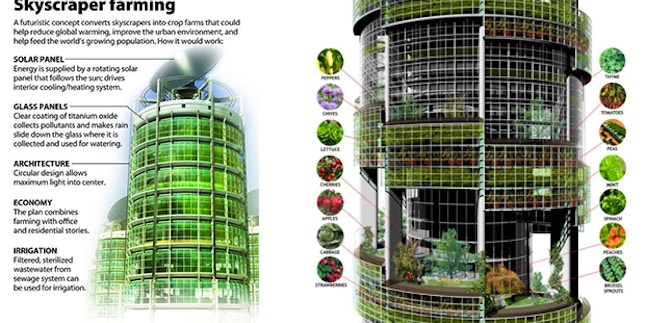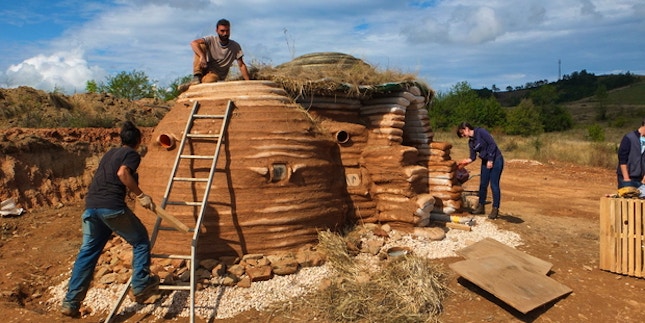- scritto da Redazione
- categoria Green Economy
Il vigneto sostenibile in Svezia. Intervista ai fondatori di Långmyre Vineri
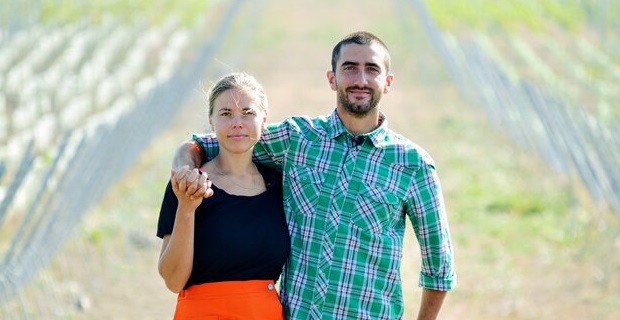
[English below]
Dal fortuito incontro nella patria del Chianti Classico all’avvio del progetto di un vigneto sostenibile in Svezia è stato un passo.
Andrea, giovane enologo italiano, ed Emma, giovanissima svedese che dei vini ha deciso di fare la sua vita, hanno appena lasciato Stoccolma per trasferirsi, insieme al loro cane Pinta, a Gotland, un’isola dal clima mite nel mezzo del mar Baltico in cui nascerà Långmyre Vineri, il loro vigneto sostenibile.
Li abbiamo intervistati perché la loro non sarà un’azienda vitivinicola qualunque. Entrambi grandi amanti della Natura, Andrea ed Emma, 29 e 25 anni, vivono prestando attenzione alla loro “impronta” sul pianeta e stanno studiando il modo per rendere la propria azienda ad impatto zero.
Perciò tutto, dall’impianto del vigneto alla raccolta delle uve, dalla produzione di un vino di qualità, che sarà biologico, alla sua distribuzione, sarà volto alla sostenibilità.
Quest'anno hanno realizzato la prima vendemmia. Vediamo come è andata.
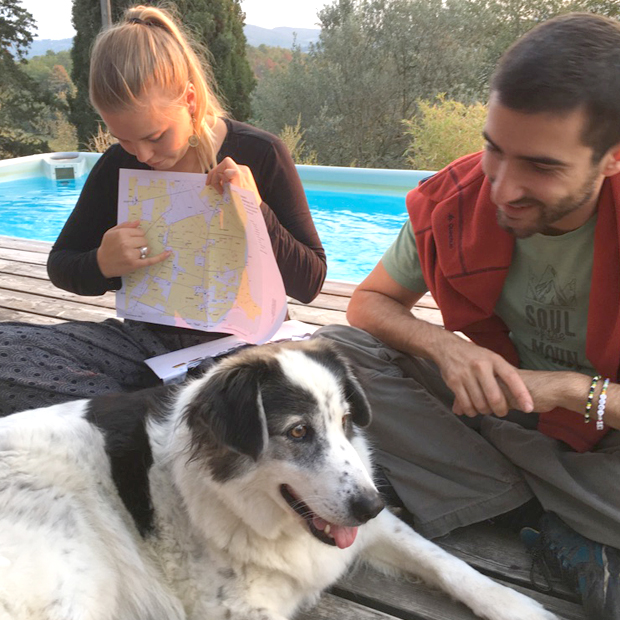
Antonia: Innanzitutto come vi siete incontrati e come vi è venuta in mente l’idea di impiantare un vigneto sostenibile?
Andrea: Dopo anni come enologo nei vigneti di mezzo mondo, tra America, Nuova Zelanda e la Francia dello Chablis, sono approdato nella patria del Chianti Classico, in Toscana, come responsabile di produzione nella stessa azienda in cui Emma, attirata dalla possibilità di apprendere di più sui processi legati al vino, si occupava delle strategie di vendita.
E’ lì che ci siamo incontrati e abbiamo iniziato a condividere il sogno di un vigneto ad “impatto zero”, obiettivo troppo spesso visto come utopia naïve dai consigli di amministrazione.
La sostenibilità non è mai stata messa in dubbio, fin dal primo momento, la sentiamo come un dovere, una missione. Per questo abbiamo deciso di perseguire la strada della sostenibilità senza compromessi, impegnandoci affinché l’“obiettivo impatto zero” influenzi ogni decisione.
A: Date le origini italiane di Andrea, e la popolarità del vino italiano nel mondo, la domanda che sorge più spontanea è: come mai avete scelto la Svezia per il vostro progetto?
Andrea: Le temperature anomale degli ultimi anni hanno messo a dura prova la produzione vitivinicola in Italia, e diversi studi dimostrano che per via del cambiamento climatico, entro il 2050 l’Italia non sarà più un paese ideale per la coltivazione della vite.
Perciò abbiamo deciso di intraprendere questa avventura a latitudini più elevate, e abbiamo scelto la Svezia, Paese di provenienza di Emma, per il nostro progetto.
La speranza è di tramandare i nostri valori di qualità e rispetto del pianeta alle generazioni successive.
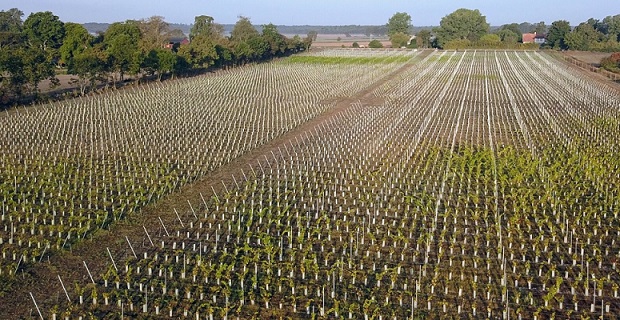 Il vigneto di Langmyre oggi, in una foto aerea
Il vigneto di Langmyre oggi, in una foto aerea
A: Una sfida nella sfida, visto il clima?
Emma: Il clima è senz’altro un fattore determinante in un settore come quello della viticoltura, così legato al territorio.
Sebbene la coltivazione della vite in Svezia sia possibile, noi abbiamo scelto Gotland per Långmyre Vineri. Lì il clima è più mite e le ore di luce al giorno superiori che nel resto della Svezia. Anche la vegetazione è più vicina alla sfera mediterranea che a quella scandinava, ma le temperature medie nel periodo primaverile ed estivo sono decisamente più basse che nel Bel Paese, il che rappresenta un ostacolo ad una conduzione tradizionale della vigna.
Noi viviamo questa sfida come uno stimolo enorme alla ricerca ed allo sviluppo di tecniche che ci consentano di centrare i nostri obiettivi enologici.
A: Potete considerarvi dei pionieri?
Emma: Le autorità svedesi sentono molto il problema del cambiamento climatico e dell’inquinamento. Basti pensare che in Svezia la somministrazione di rame ed altri agrofarmaci normalmente utilizzati altrove, è vietata. Siccome il fattore inquinante più incidente nella conduzione di un vigneto, anche a conduzione biologica, è l’utilizzo di pesticidi, l’impatto ambientale delle aziende vitivinicole del paese è già molto ridotto. Ma noi vogliamo fare di più, e in questo senso sì, ci piace considerarci dei pionieri.
Lo scenario vitivinicolo svedese è al momento dominato dalla precedente generazione, i cosiddetti “seniors”. Noi siamo forti di prospettive e ambizioni innovative, che portino alla realizzazione di un’azienda dinamica, moderna, sostenibile, unica nel suo genere nel Paese.
A: Quali accorgimenti adotterete per rendere la vostra vigna sostenibile?
Andrea: L’aiuto più importante nel ridurre l’impatto ambientale di Långmyre Vineri è dato dalle piante stesse. Le viti che pianteremo derivano da anni di sperimentazione di Rauscedo, vivaio italiano leader mondiale nella produzione di barbatelle (germogli di vite n.d.r.), che investe da sempre in sperimentazione per il miglioramento qualitativo delle piante di vite. Pianteremo esclusivamente viti resistenti alle malattie, il che ci consentirà di ridurre al minimo i trattamenti. I pochi trattamenti che risulteranno necessari saranno esclusivamente a base di ortica o estratti d’alghe.
Abbiamo anche iniziato un’attività di ricerca insieme a Rauscedo per sperimentare nuove varietà resistenti che si possano adattare al meglio alle nostre latitudini riducendo ulteriormente le emissioni.
Prediligeremo interventi manuali ad operazioni con il trattore e altri mezzi meccanici. Così non solo ridurremo le emissioni, ma potremo osservare, seguire personalmente e toccare ognuna delle 24 mila piante. Anche la raccolta dell'uva (quest'anno c'è stata la prima) è stata effettuata rigorosamente a mano.
Per il confezionamento del prodotto utilizzeremo vetro, carta e cartone riciclati e, per le consegne locali, un mezzo ibrido.
Ma vogliamo fare di più: in una cospicua porzione della superficie aziendale lasceremo che cresca una foresta autoctona, che favorisca la biodiversità ospitando fauna e flora locali e ci aiuti ad avere un’impronta positiva sul pianeta.
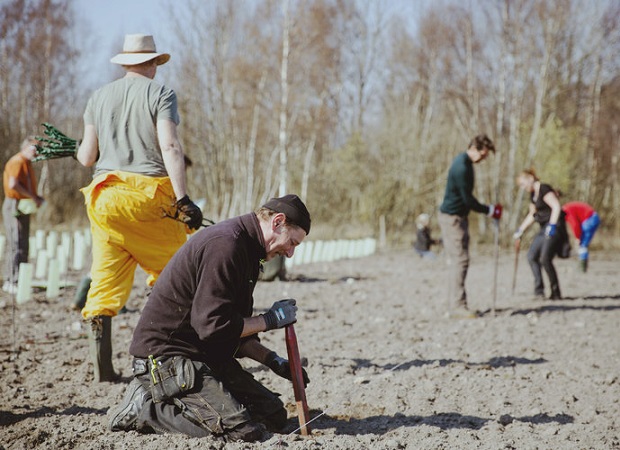 Ognuna delle circa 24 mila viti è stata piantata a mano, utilizzando attrezzi della viticoltura tradizionale.
Ognuna delle circa 24 mila viti è stata piantata a mano, utilizzando attrezzi della viticoltura tradizionale.
A: Che vino produrrete?
Andrea: Le cinque varietà d’uva che abbiamo piantato (Cabernet Volos, Merlot Kanthus, Fleurtai, Soreli, Sauvignon Kretos) ci permetteranno di produrre una gamma diversificata di vini. Inizieremo con il produrre un rosato, un bianco e un rosso fermi da pronta beva (adatti ad essere bevuti giovani per apprezzarne la freschezza n.d.r.), ed uno spumante destinato a 12 mesi di affinamento in cantina.
I primi vini che produrremo avranno un gusto internazionale che possa essere facilmente apprezzato e bevuto dai consumatori. Con l’aumentare dell’esperienza e della conoscenza delle nostre vigne cercheremo però di far esprimere il terroir, cercando e inventando la tipicità di Gotland.
Ogni vino sarà caratterizzato dal marchio KRAV, certificazione svedese che attesta cibo e bevande ottenuti da un processo produttivo etico e sostenibile dal punto di vista ambientale.
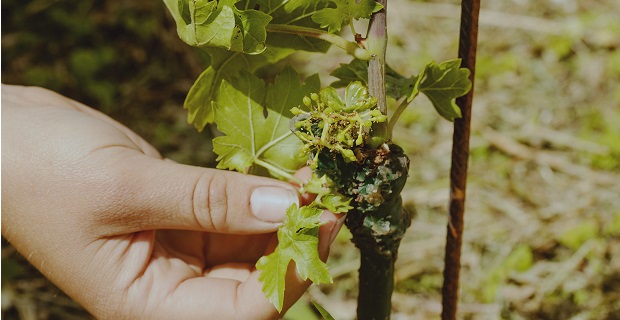 L'idea è quella di seguire personalmente e toccare ognuna delle 24 mila piante, senza aggredirle con mezzi meccanici né, ovviamente, pesticidi e prodotti chimici di alcun tipo.
L'idea è quella di seguire personalmente e toccare ognuna delle 24 mila piante, senza aggredirle con mezzi meccanici né, ovviamente, pesticidi e prodotti chimici di alcun tipo.
A: Come immaginate la vostra azienda in futuro?
Andrea: Quest'anno abbiamo prodotto la prima annata di Långmyre Vineri. Il sogno è di effettuare le spedizioni verso Stoccolma percorrendo le 70 miglia marine che ci separano dalla terra ferma con una barca a vela anziché con i tradizionali traghetti.
Tra 10 anni, saremo in grado di produrre 40.000 bottiglie annue di un vino capace di conquistare sia consumatori locali che internazionali.
Siamo convinti del fatto che la Svezia possa diventare una realtà enologica emergente nelle prossime decadi e siamo fieri di essere tra i primi a credere in questo territorio e speriamo che i valori di qualità e sostenibilità alla base della nostra azienda saranno d’esempio per quelli che ci seguiranno.
Per informazioni e domande sulle possibilità di diventare partener o entrare a far parte del progetto di Långmyre Vineri, azienda vitivinicola sostenibile, scrivete a:
Emma Questo indirizzo email è protetto dagli spambots. È necessario abilitare JavaScript per vederlo.
Andrea Questo indirizzo email è protetto dagli spambots. È necessario abilitare JavaScript per vederlo.
O visitate il sito di Långmyre Vineri
__________________________________________________
A sustainable vineyard in Sweden. Interview with the founders of Långmyre Vineri
From the casual encounter in the region of Chianti Classico to the starting of the project for a sustainable vineyard in Sweden it has been a quick passage.
Andrea, young italian winemaker, and Emma, even younger Swede that decided to make wine her work and life, have just left Stockholm with their dog Pinta, and embark on a new adventure on Gotland - the biggest Swedish island of two in the middle of the Baltic sea. There they will start to build Långmyre Vineri, a vineyard and winery with uncompromised attention to sustainability and quality.
We interviewed them because this winery will be one of its kind. Both great lovers of nature, Emma and Andrea, 25 and 29 years old, live their life paying attention to their footprint on the planet and they are studying a way to make theirs a zero impact business.
This means that everything - from the planting of the vineyard, to the harvest, to the production of a high qualitative (organic) wine and its distribution, will be focused on sustainability.
Antonia: first of all how did you meet and how did you get the idea to plant a sustainable vineyard.
Andrea: After many years of working as a winemaker all around the world, starting in USA, New Zealand and France I landed back in Italy in the core of the Chianti Classico area, Tuscany. There I started working as the production manager of the same winery where Emma was working with marketing and selling strategies. It did not take long until we found each other and the mutual love for sustainability and wine.
As many couples we shared our hopes and dreams and soon began forming the vision of running our own winery where sustainability would be the silver lining - alongside making a great wine of course.
Sustainability was always the core of the project from the first moment, we feel like it’s a duty and a mission to have that influence every decision we make.
A: Given the italian origins of Andrea and the popularity of italian wine in the world, the most spontaneous question is: why did you choose Sweden for the project?
The anomalous temperatures of the last years have been a tough challenge for the italian viticulture, and different studies show that due to climate change, within 2050, Italy won’t be suited for vinegrowing anymore.
So we decided to start this adventure at higher latitudes and we choose Sweden, Emma’s homeland. This way we see ourselves establishing a long term concept with values of quality and respect for the planet not only we will get to experience but also next generations.
A: A double challenge due to weather then?
Emma: Weather is for sure a key factor in a sector like viticulture that is so bonded to the territory.
Viticulture is possible in Sweden, especially in the south. We choose Gotland for Långmyre Vineri where the weather is milder and the sunhours are more than the rest of Sweden. Also the local flora is closer to the Mediterranean one that to the Scandinavia one. Of course, we are still talking about a Nordic climate and we will have to adapt some techniques to the lower temperatures.
Luckily a lot is happening within the non-conventional viticulture and we see great possibilities in achieving our enological goals thanks to the scientific research and development of techniques performed around the globe.
A: Can you consider yourselfs pioneers?
Emma: Swedish authorities are very sensitive to climate change and environment. An example is that in Sweden is forbidden to treat the vineyards with copper and other pesticides allowed everywhere else. Since the most polluting factor in vine growing, even an organico one, is the usage of pesticides, the impact of the other wineries of the country is already little. But we want to do more. In that sense you might call us pioneers.
The Swedish wine scene is right now dominated by the previous generation whereas we stand out from the rest. We are among the first, young people to jump in head first and invest everything we have in winemaking at this scale. We are full of innovative prospects and ambition that we hope will bring us to the realization of a dynamic, modern and sustainable company.
A: What precautions will you adopt to make your winery sustainable?
Andrea: The biggest help to reduce the environmental impact of Långmyre Vineri will come from the vineyards. The vines we will be planting are the results of decades of research made by Vivai Rauscedo, an Italian plant nursery which is the world leader in vine making.
We will plant solely disease-resistant vines, which will allow us to reduce the necessity of spraying to a bare minimum. The spray itself will be based on naturally degradable products such as moss and algae.
We will also be collaborating with Rauscedo by testing new disease resistant varieties and thereby expanding the selection of vines of this kind on the market.
We will prefer manual interventions rather that the usage of tractors and other machinery in the vineyards. This allows us to not only reduce emissions, but also touch and observe every single of the 24 thousand vines.
For the packaging we will use only recycled paper, glass and cardboard and we will use an hybrid vehicle for the local shipping.
But we want to do more. A big part of the farm will be left untouched in order to have a local forest growing that will promote biodiversity hosting local flora and fauna and that will help us to have a positive footprint on the planet.
A: what wine will you produce?
Andrea: Our five different grape varieties (Cabernet Volos, Merlot Kanthus, Fleurtai, Soreli, Sauvignon Kretos) will allow us to produce a wide range of wines, starting with a rosè, a white and a red wine that will be light and young - perfect for summer nights, casual dinners or just together with a slice of cheese. We will also make an elegant, sparkling wine aged 12 month before release.
At first we will be producing wines with an international taste that can be easily appreciated by customers. But with the increase of experience and knowledge of the vineyards we will try to express more the terroir in the wines and at the same time we will invent and find the Gotland typicality.
Each wine will KRAV certified, attesting that it has been produced in an environmentally friendly and ethical way.
A: How do you imagine Långmyre Vineri in the future?
Andrea: In three years we will produce the first vintage of Långmyre Vineri. Our dream is to do the overseas shipping by sailing the 700 kilometers between Gotland and the mainland rather than with the normal ferries.
In 10 years we will be able to produce 40.000 bottles a year of a wine capable to convince not only the local consumer but also the international one.
We are sure that Sweden will become an enological reality in the next decades and we are proud to be within the firsts to believe in this terroir and we hope that the values of quality and sustainability, so important for our us, will serve as an example to the ones that will follow.
For info and questions regarding the possibilities to become partners or how to join our project, write at:
Emma Questo indirizzo email è protetto dagli spambots. È necessario abilitare JavaScript per vederlo.
Andrea Questo indirizzo email è protetto dagli spambots. È necessario abilitare JavaScript per vederlo.
Or visit Långmyre Vineri website
